This document provides an overview of resources for studying Aristotle's Metaphysics, including general introductions, editions of the original Greek text, translations, and commentaries. It discusses the complex history of the text and outlines some of the key philosophical issues addressed in the Metaphysics, such as substance, essence, and universals. The document aims to guide readers through the vast body of scholarly work on Aristotle's influential work.
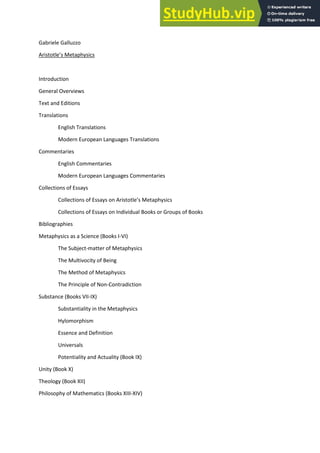
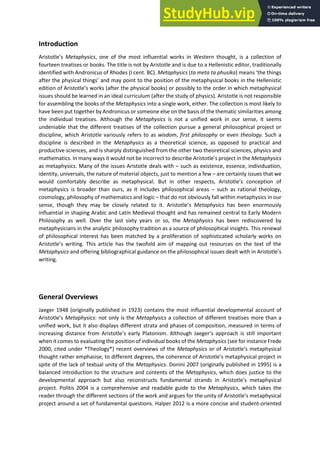
![guide, which takes the reader through the text and introduces to the philosophical issues it raises.
Reeve 2000 is an ambitious book-length attempt to provide a strongly holistic and unitary account of
A istotle s etaph si s a d of the Metaphysics), which basically disregards issues of chronology and
only focuses on philosophical issues. Other introductory studies fo us o e o A istotle s
metaphysical doctrines than the structure of the Metaphysics. Barnes 1995 is an overview of
A istotle s metaphysics which covers many areas of interest: the subject-matter of metaphysics,
existence, substance and theology. Cohen 2016 discusses some major metaphysical issues, with
particular reference to substance theory, and offers an extensive and up-to-date bibliography.
Barnes, J. 1995. Metaphysics. In The Cambridge Companion to Aristotle. Edited by J. Barnes, 66-108.
Cambridge, UK: Cambridge Univ. Press. A lea o e ie of A istotle s etaph si al thought, hi h
covers four main areas: the subject-matter of metaphysics; the multivocity of being; the theory of
substance; theology. Provides valuable bibliographical information. Good for an introduction to the
topic.
Cohen, M. 2016. A istotle s Metaph si s. In *Stanford Encyclopedia of Philosophy
[http://plato.stanford.edu/entries/aristotle-metaphysics/]*. An overview of some of the major ideas
de eloped i A istotle s Metaphysics, with an emphasis on substance theory in the central books (VII-
IX). Provides extensive and up-to-date bibliography.
Donini, P. 2007. La Metafisica di Aristotele. Introduzione alla lettura. Rome: Carocci. Originally
published in 1995, this is a clear and short introduction to the structure and contents of the
Metaphysics. Also provides valuable information about the history of the text and its transmission.
Especially good for beginners.
Halper, E.C. 2012. A istotle’s Metaphysics. A Reade ’s Guide. London and New York: Continuum. A
concise and student-o ie ted guide to A istotle s Metaphysics. Offers an overview of themes as well
as an introduction to the different sections of the text. Also provides a short discussion of the
reception of the Metaphysics.
Jaeger, W. 1948. Aristotle: Fundamentals of the History of his Development. Trans. by R. Robinson.
Oxford: Oxford Univ. Press. The ost i po ta t a ou t of the de elop e t of A istotle s thought.
Chs. 7, 8 and 14 present a developmental analysis of the Metaphysics. Argues that the Metaphysics
contains two fundamental strata: one in which Aristotle is still influenced by the Platonic conception
of metaphysics as a science of immaterial substances, and a later anti-Platonic stratum, in which
Aristotle develops his idea of metaphysics as a general study of reality. Originally published in German
in 1923.
Politis, V. 2004. The Routledge Guide to Aristotle and the Metaphysics. London and New York:
Routledge. A readable and comprehensive section-by-section guide to the Metaphysics, which
atte pts to e o st u t A istotle s o e all etaph si al p oje t and puts emphasis on its unity around
a set of fundamental questions. Particularly i te esti g is the a al sis of A istotle s a ti-Platonic
arguments in Ch. 9.
Reeve, C.D.C. 2000. Su sta tial K owledge. A istotle’s Metaph si s. Indianapolis, IN: Hackett
Publishing Company. An ambitious book-le gth stud of the hole of A istotle s etaph si al thought.
A gues fo the fu da e tal u it of A istotle s Metaphysics. Sees A istotle s theolog as the solutio
to the difficulties surrounding the notion of substance (and in particular the tension between the
ontological priority of particulars and the epistemic priority of universals) and so in some sense as the
poi t of a i al of A istotle s etaph si al i estigatio .](https://image.slidesharecdn.com/aristotlesmetaphysics-230806125330-eea483ba/85/Aristotle-S-Metaphysics-3-320.jpg)
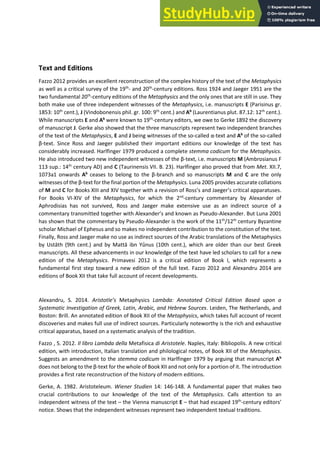

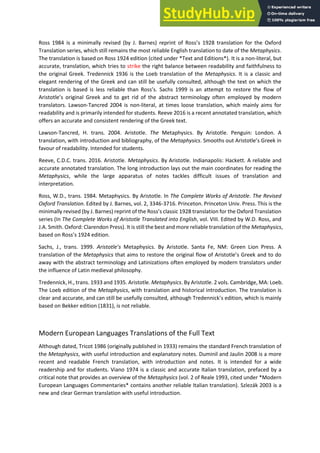
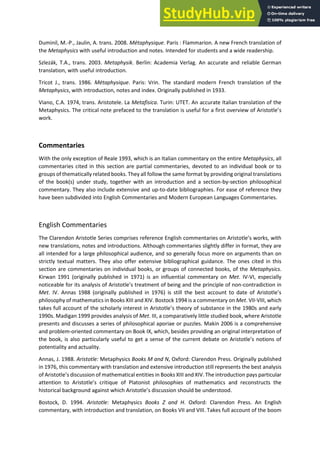
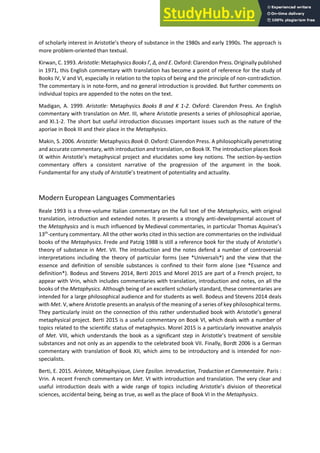
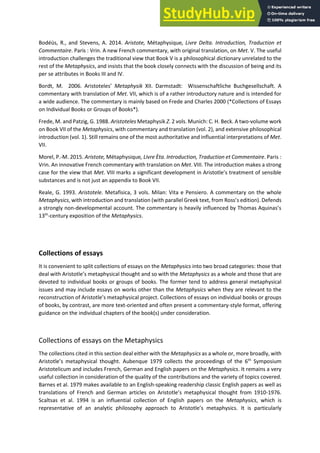
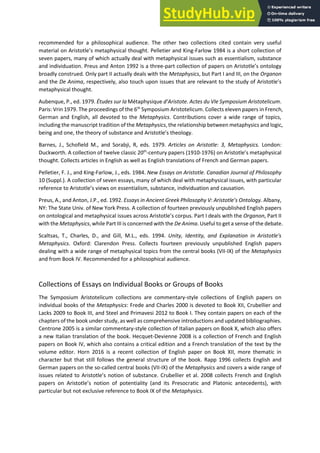
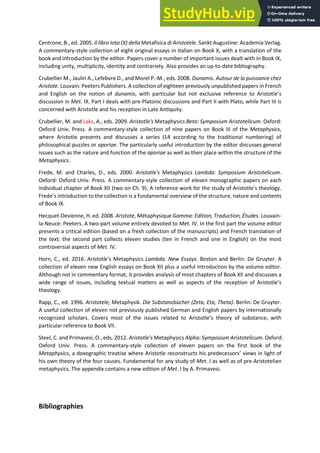
![Radice and Davies 1997 is the only comprehensive annotated bibliography o A istotle s Metaphysics,
which offers guidance on editions, translations, studies and instruments o A istotle s o k up to 1996.
Barnes et al. 1995 is a selective i liog aph o A istotle s thought as a hole, ith o e tha ,
thematically organized entries on the Metaphysics. Barnes et al. 1981 is a very selective bibliography,
which is intended for an English audience and is particularly useful for beginners. Gill 2005 is an
extremely helpful paper, which discusses at some length the main strands in contemporary
scholarship on the Metaphysics as well as a number of individual books and papers. The International
Aristotle Bibliography is an online subscription database collecting over 50,000 books, papers, reviews
and dissertations on Aristotle.
Barnes, J., Schofield M., and Sorabji, R., eds. 1981. Aristotle. A Selective Bibliography. Oxford: Sub-
Faculty of Philosophy. Though obviously dated, this very selective bibliography is still a useful
instrument for a first orientation. Intended for an English-speaking audience.
Barnes, J., Schofield, M., and Sorabji, R.. 1995. Bibliography. In The Cambridge Companion to Aristotle.
Edited by J. Barnes, 295–384. Cambridge, UK: Cambridge Univ. Press. An annotated bibliography on
all the diffe e t a eas of A istotle s philosoph . Citatio s a e o ga ized the ati all . Contains over
e t ies o A istotle s Metaphysics.
Gill, M.L. 2005. A istotle s Metaphysics Reconsidered. Journal of the History of Philosophy 43.3: 223-
241. The paper provides a critical overview of the most recent strands in scholarship o A istotle s
Metaphysics and discusses several individual contributions to the field. Excellent for a first overview
of the literature.
Radice, R, and Davies, R. 1997. Aristotle's Metaphysics: An Annotated Bibliography of the Twentieth-
Century Literature. Leiden, The Netherlands, New York, and Cologne, Germany: Brill. This is the English
version of an Italian bibliography published in 1997 as La Metafisica di Aristotele nel XX secolo:
bibliografia ragionata e sistematica. Milano: Vita e Pensiero. Compiled with the help of a large team
of around fifty scholars, it is a complete, annotated bibliography of 20th
-century (up to 1996) studies,
material a d i st u e ts o A istotle s Metaphysics. Especially useful for scholarly work.
*International Aristotle Bibliography [http://bibliographies.brillonline.com/browse/international-
aristotle-bibliography]*. An online subscription database giving access to over 50,000 books, articles,
e ie s a d disse tatio s o A istotle. Ma aged ‘. I ga dia, f o St. Θoh s U i e sit , Ne Yo k.
Updated biannually.
Metaphysics as a Science (Books I-VI)
It seems clear that there is a science or discipline that Aristotle self-consciously theorizes about and
practises in the fourteen treatises that have come down to us under the title Metaphysics. Although
this is ot A istotle s a of des i i g it, let us all su h a s ie e etaph si s isdo , theolog ,
fi st philosoph o si pl philosoph a e a o g A istotle s a s of ha a te izi g the dis ipli e he
is after in the Metaphysics). There are several issues that scholars have discussed in connection with
metaphysics as a scientific discipline, but four have been particularly central to the debate. (i) One
obvious question concerns the subject-matter of metaphysics, i.e. what metaphysics is about and
what it studies. (ii) The second issue naturally stems from the first. In Met. IV.1-2 Aristotle presents
metaphysics as a universal science that studies all beings, everything that there is. Although there are](https://image.slidesharecdn.com/aristotlesmetaphysics-230806125330-eea483ba/85/Aristotle-S-Metaphysics-12-320.jpg)
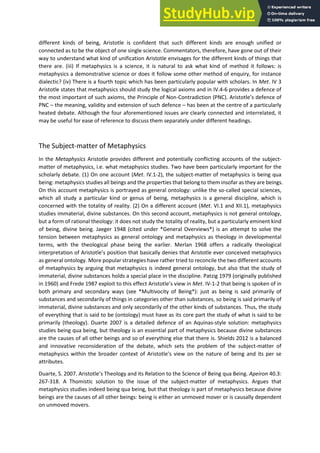

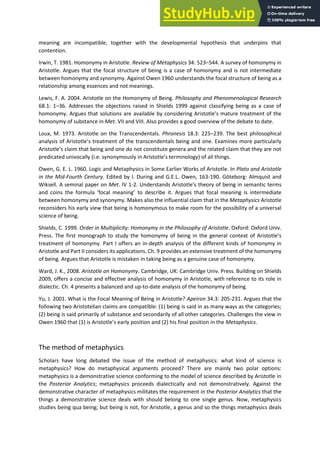
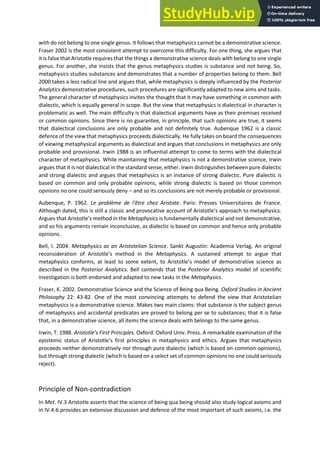
![Principle of Non-Contradiction (PNC). Wedin 2012 discusses at length the issue as to why metaphysics
should stud the logi al a io s. A istotle s defe e of PNC is particularly complex and problematic.
Gottlieb 2015 is a comprehensive and detailed overview of the main problems raised by Aristotle s
text with extensive and up-to-date bibliography. Łukasie i z o igi all pu lished i is a
ea l a d i flue tial assess e t of the oge of A istotle s defence of PNC. One major difficulty is
that, as Łukasie i z observes, in IV.4-6 Aristotle seems to present at least three different versions of
PNC – an ontological, a semantic and a doxastic version – and it is often difficult to decide which
version he has in mind at each stage of the argument. The main difficulty, however, is the very nature
of A istotle s defe e of PNC in IV.4. Code 1997 and Bolton 1994 provide two different assessments
of Aristotle s st ateg . A istotle observes in IV.4 that PNC is indemonstrable and can be defended only
through elenctic refutation, i.e. by refuting those who deny its validity. Code 1997 takes this to mean
that, if PNC a ot e de o st ated, it a ot e p o ed i a othe a , a d so A istotle s ele ti
defence of PNC is not a proof. Of course there may be a series of truths that can be proved about PNC,
such as its being the firmest of all principles, but the principle itself remains unproved. This somehow
traditional view has been challenged by Bolton 1994, who maintains that the elenctic refutation is a
proper dialectic proof of PNC, conducted according to the rules of peirastic, a particular sub-species
of the dialectical method. A istotle s dis ussio of PNC lea es a se ies of othe uestions open: does
the dis ussio p esuppose A istotle s esse tialis ? Does PNC appl to all p edi ates o o l to
su sta tial o es? Is A istotle s a gu e t t a s e de tal? Shi e is a jou al issue e ti el
devoted to PNC, which addresses these and other questions. One final feature of the discussion of
PNC has puzzled interpreters. In IV.5- A istotle o e ts the de ial of PNC ith P otago as a d
He a litus elati is . The issue is discussed at some length in Wedin 2004.
Bolton, R. 1994. A istotle s Conception of Metaphysics as a Science. In Unity, Identity, and Explanation
i A istotle’s Metaph si s. Edited by T. Scaltsas, M.L. Gill, and D. Charles, 321-354. Oxford: Oxford Univ.
P ess. A o igi al e a i atio of A istotle s ele ti p oof of PNC. Against Code 1987, argues that PNC
itself is proved. Insists on the dialectical (in particular peirastic) nature of the proof. Challenges the
ie that the p oof of PNC p esupposes A istotle s esse tialis .
Code, A. 1987. Aristotle's Investigation of a Basic Logical Principle: Which Science Investigates the
Principle of Non-Contradiction? Canadian Journal of Philosophy 16.3: 341-357. An influential paper,
which argues that, although PNC is indemonstrable, Aristotle demonstrates in Met. IV several truths
about it, including the claim that PNC is the firmest of principles.
Gottlieb, P. 2015. Aristotle on Non-contradiction. In *Stanford Encyclopedia of Philosophy
[http://plato.stanford.edu/entries/aristotle-noncontradiction/]* A detailed and comprehensive
o e ie of A istotle s t eat e t of PNC i IV. -6. Touches upon all the major issues discussed in the
literature. Provides up-to-date and extensive bibliography.
Łukasiewicz, J. 1979. Aristotle on the Law of Contradiction. In Articles on Aristotle: vol. 3 Metaphysics.
Edited by J. Barnes, M. Schofield, and R. Sorabji, 50-62. New York: St. Martin's Press, 1979. A classic
and still penetrating analysis of PNC by a major 20th
-century logician. Clearly distinguishes between
A istotle s different versions (ontological, logical and psychological) of PNC and raises a number of
critical points. Fundamental for any subsequent discussion. Originally published as: Über den Satz des
Widerspruchs des Aristotles. Bull. I te . de l’A ade ie des S ie es de Cracovie 1910.
Shiner, R., ed. 1999. Apeiron: A Journal for Ancient Philosophy and Science 23.3. A journal issue entirely
de oted to A istotle s dis ussio PNC. Topi s o e ed i lude: PNC in early Greek philosophy; the role](https://image.slidesharecdn.com/aristotlesmetaphysics-230806125330-eea483ba/85/Aristotle-S-Metaphysics-17-320.jpg)
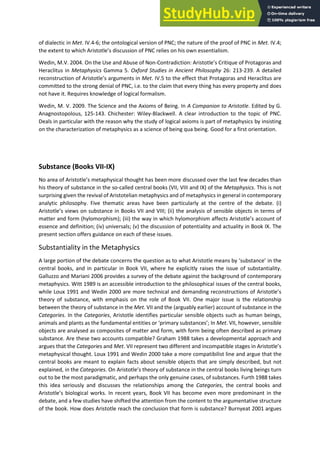
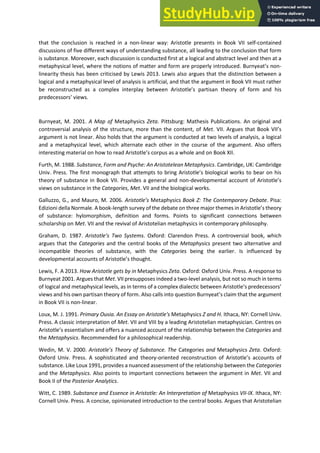

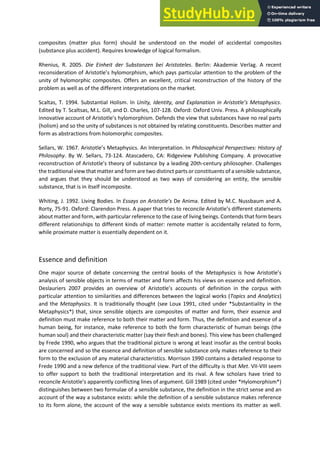
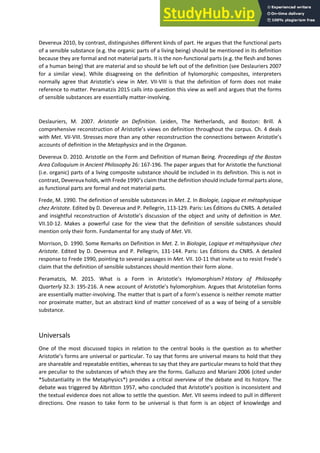
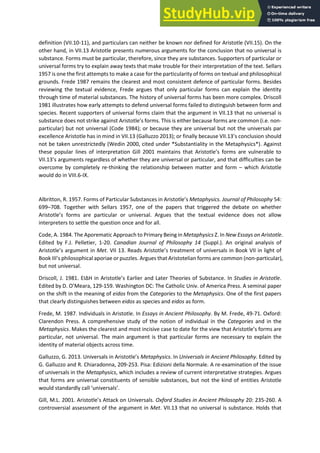
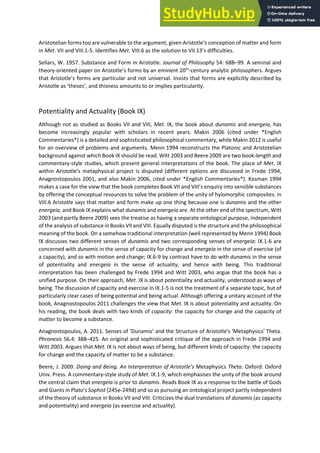
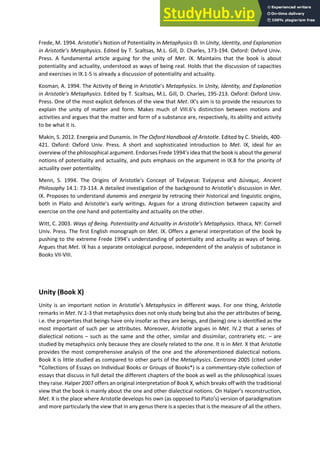

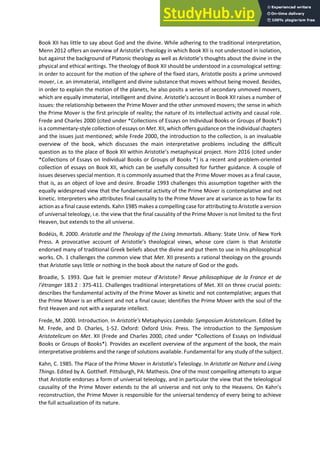
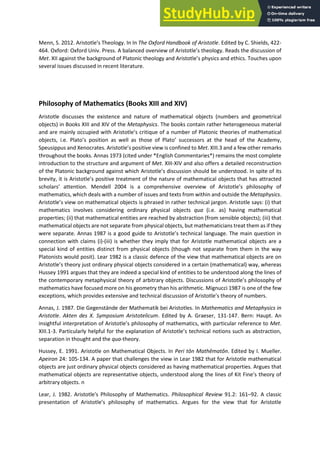
![mathematical objects are not a distinct kind of objects, but just ordinary physical objects considered
as having mathematical properties.
Mendell, H. 2004, Aristotle and Mathematics. In *Stanford Encyclopedia of Philosophy
[http://plato.stanford.edu/entries/aristotle-mathematics/]*. An excellent and comprehensive
o e ie of A istotle s philosoph of athe ati s o e of the leadi g e pe ts o G eek
mathematics. Contains extensive discussion of the major themes in Met. M and N and offers adequate
historical and theoretical context. Also provides extensive bibliography.
Mignucci, M. 1987. A istotle s A ith eti . In Mathematics and Metaphysics in Aristotle. Akten des X.
Symposium Aristotelicum. Edited by A. Graeser, 175-211. Bern: Haupt. A comprehensive
e o st u tio of A istotle s philosoph of u e s a ith eti , mainly based on Met. XIII.3 and Phys.
IV. Defends a general interpretation along the lines of Lear 1982. Requires some knowledge of
mathematical formalism.](https://image.slidesharecdn.com/aristotlesmetaphysics-230806125330-eea483ba/85/Aristotle-S-Metaphysics-29-320.jpg)